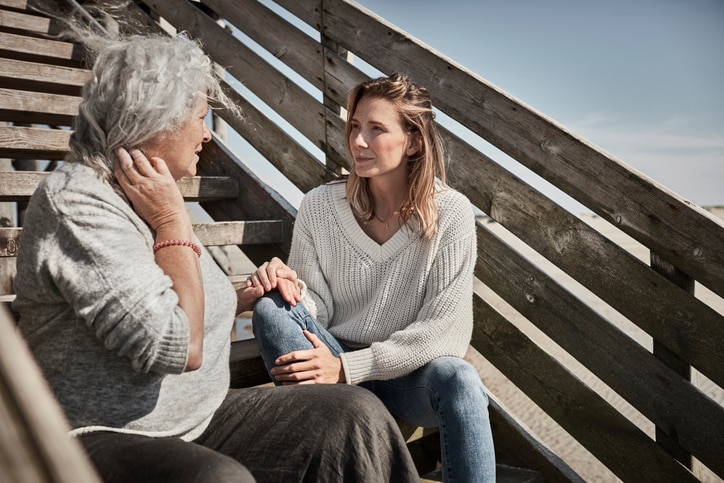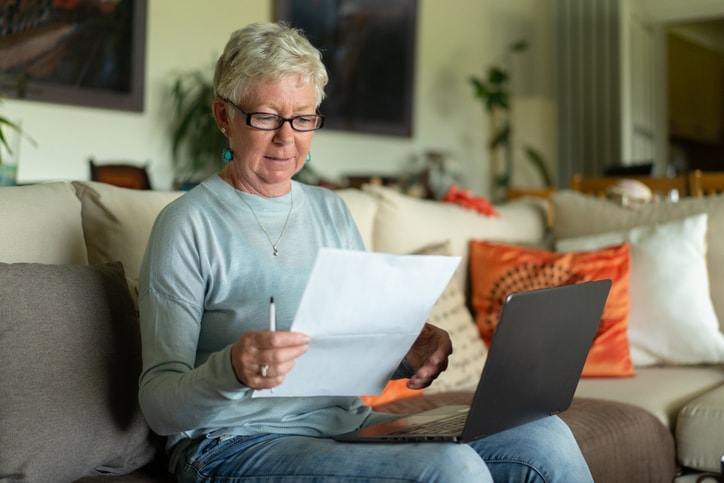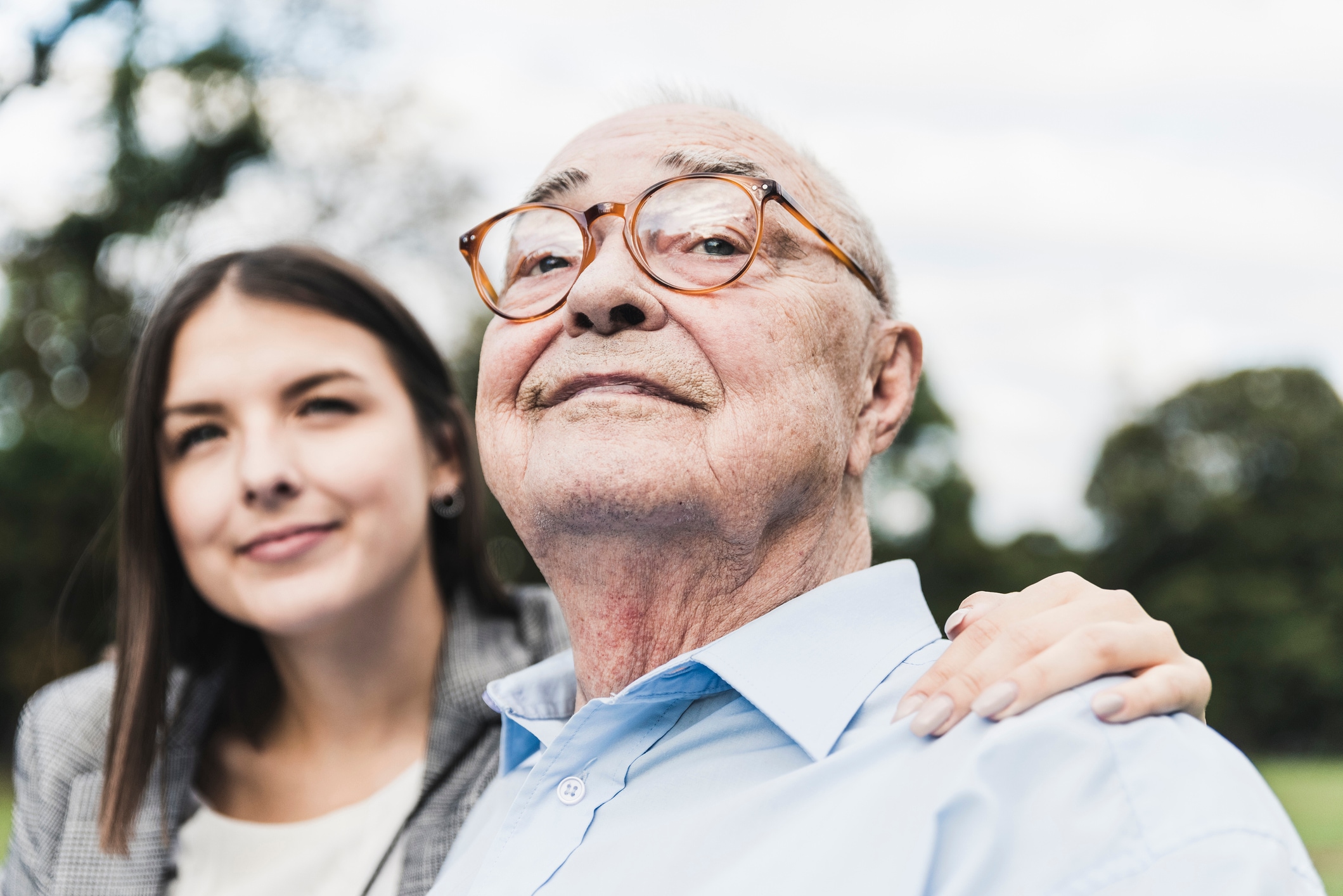Family caregiving between child and aging parent or partner to partner often facilitates emotional bonding and feelings of gratitude between caregiver and loved one, but over time, it can also take an emotional, mental and physical toll on caregivers. And when a loved one dies or moves into formal care and the caregiver role ends, you may have to navigate the symptoms associated with post-caregiving syndrome (PCS), in addition to grieving the loss of your loved one.
Brenna Renn, licensed psychologist and assistant professor of psychology at the University of Nevada in Las Vegas, says, the caregiver response to a loved one’s death can vary depending on the situation. For example, she says, “The experience of someone who is no longer caregiving because of a sudden death of their loved one is very different from the experience of someone whose care recipient has moved into a facility with skilled nursing assistance and formal caregiving support.”
When it comes to “informal caregiving” — a situation she describes as friends or family caring for an individual — it can be “exhausting and all-consuming,” as well as a shock when it suddenly ends.
Former caregivers may experience a myriad of symptoms related to post-caregiving syndrome, and the experts we spoke with share insights on how to recognize the signs.
What is post-caregiver syndrome?
Experts agree that post-caregiving syndrome is complex and will not show up the same for everyone.
Renn says, “Post-caregiving syndrome refers to the constellation of psychological and physical symptoms a person may endure after their caregiving responsibilities end.” She adds that this usually takes the form of “emotional distress, encompassing depressed mood and sadness, anxious thoughts or feelings, anger, grief, a loss of sense of self and uncertainty about the future.”
Bonnie Scott, therapist and founder of Mindful Kindness Counseling in Austin, Texas, notes post-caregiving syndrome includes the expected feelings of grief and loss but carries the compounding emotions that come with the loss of part of our identity. She says, “The work of providing care to a loved one can take a lot of time, money and emotional energy. We may have cared for them physically, financially, emotionally or all of the above. Those are big commitments, and when those are done, we may feel incredibly empty.”
Deborah Magdelena from Miami is one of three siblings and says she found herself “consumed” with taking care of her elderly mother who suffered from pulmonary fibrosis. When her mother became immobile and required 24-hour oxygen, Magdalena continued to not only take care of her mother’s medical needs, but also committed to doing her mother’s hair, nails and makeup, so she could look and feel her very best.
After her mother died in 2022, Magdelena said she felt a sense of peace that she did everything she could do to make her mom feel comfortable and loved. She felt she had done everything her mother wanted her to do, but she still relied on therapy and the support of her siblings and loved ones to manage the deep grief and symptoms of post-caregiver syndrome that she experienced.
Common signs and symptoms of post-caregiving syndrome
Common signs of post-caregiving syndrome include:
- Emotional distress, encompassing depressed mood and sadness.
- Anxious thoughts or feelings.
- Physical symptoms such as fatigue, diffuse aches and pains or appetite changes.
- Sleep disruptions.
- Feelings of uncertainty about the future.
Aimlessness was a symptom highlighted by Francesca Irene Decker, a family doctor based in New York, who shared that she “felt numb for a solid month after [her] mother died.” She says she remembers “drifting, feeling detached and watching life” as if she were not a part of it.
Coping with post-caregiving syndrome
Decker supports both family and professional caregivers by providing resources and coping strategies. She also has the personal experience of caring for her mother alongside her stepfather until her mother’s passing.
Her stepfather had been her mother’s caregiver for eight years as her mother’s health deteriorated, and she became increasingly dependent on him. “He felt the weight of her life on his shoulders,“ she says. “So when she died, I think in some ways it was a relief for him, but he was also lost for months.”
“Relief is an important experience to call out here, and to normalize,” says Renn. “Care recipients often struggle with various behaviors that make caregiving very difficult and stressful — issues like suspiciousness, agitation, aggression or personality changes associated with various types of dementia. [These behaviors can make it] feel like the care recipient is no longer the person they used to be,” she adds.
Scott says the complex emotions caregivers experience when their role ends and their daily lives change is understandable. “We may feel anxiety because we aren’t sure how to spend our time or feel we are forgetting important tasks. We may feel some relief to feel the emotional weight of active caregiving removed from our daily tasks, as well as some relief in the knowledge that our loved ones have found peace.” She adds that caregivers may also feel guilt for that relief, or wonder if they could have done more for the person they cared for.
Grisel Llerena from Miami was her mother’s only child and primary caregiver for 11 years.
When it got to the point where Llerena could no longer provide the 24-hour support her 92-year-old mother needed, she put her in an assisted living facility where she died 14 days later. Llerena still feels guilt sometimes about that decision, as well as for not having the patience or understanding she felt she needed to fully support her mother. She says she learned, “The guilt will be there, but you have to move on.”
Actionable steps for healing
Learning how to heal and move forward while navigating post-caregiving syndrome may be easier said than done, but the experts and former caregivers we spoke to offered some suggestions.
1. Engage in some sort of physical activity (even baby steps are OK)
Renn emphasizes that while it may seem counterintuitive when exhausted, engaging in regular exercise can significantly improve mental health. She says, “The stress of caregiving can take a serious toll on our bodies, which regular physical activity can help mitigate or improve.”
Decker advises “If your brain says, ‘I can’t do that,’ scale back. Start small.” She adds that big goals can be whittled down until they feel doable: Instead of walking a mile a day, you can decide to walk around the block.“ If you have a small win, you’ll be more motivated to try again tomorrow,” she says.
2. Find a new hobby, or reengage with an old one
Renn says caregiving may lead to you sidelining your own hobbies and interests, which can lead to a reduced sense of pleasure and even depression. She says, “Rebuilding a sense of identity is key in the post-caregiving phase.”
Returning to an old hobby, says Decker, was both helpful and therapeutic for her. “I took acting classes, a passion I had abandoned years earlier and decided I wanted to try again.”
3. Maintain — or rebuild — social connection
“Caregiving can be very socially isolating,” Renn says and emphasizes that reestablishing relationships is vital for mental health. “Work to reestablish relationships that were pushed aside with the demands of caregiving,” she adds.
4. Lean on your support system
Scott recommends identifying and relying on a support system “both for emotional support and love, but also for tasks and logistics.” She adds this can look like letting friends and family feed you, clean your kitchen or comfort you in the ways they know how.
5. Prioritize self-compassion
Sue Ryan, a certified hospice volunteer and caregiver advocate in Naples, Florida, was the final caregiver for her father and grandmother, who were both diagnosed with dementia, and her spouse who had Alzheimer’s disease. She advocates for grace in the healing process, asserting that grace eliminates judgment and makes it easier to accept being fragile in our emotions.
6. Accept how you feel
Ryan also says that, as a caregiver, you should listen to your heart. “If you’re sad and aren’t sure what to do, be OK with that and don’t be sad alone. Find someone to reach out to,” whether that’s a friend or a professional.
Magdelena says she learned, “In order to heal, I had to lean into the pain.” She recommends former caregivers work to name the pain and give themselves permission to express it.
Decker agrees. “Cry, yell, scream, hit a pillow, chop wood, pull weeds, join a kickboxing class. Let the anger and sadness out in a safe and/or productive way,” she says.
7. Remember there’s no timeline for grief
Scott also wants former caregivers to remember that “grief is unique, and there’s no rushing or escaping it.” She adds, “Your job is to let it come and get the emotional support you need.” And if that’s not available to you, she recommends finding a support group.
When to reach out for help
Decker says, “If you are having thoughts of hurting yourself or others, are feeling hopeless, or find yourself turning to addictions or other unhealthy behaviors, please ask for help. Start therapy, or join a support group, even if it’s online.”
She adds, “If your caregiving also involved multiple near-death episodes with your loved one, you have had to develop a type of military hypervigilance, to every cough, slurred word, missed bowel movement, rash or tenth-of-a-degree change in temperature.”
She says the impacts of living in hypervigilance can add symptoms of post-traumatic stress disorder. “You may still wake at night worrying, or find yourself checking your watch or jumping when the phone rings.” These symptoms along with flashbacks and nightmares, negative thoughts or having trouble functioning should be seen as red flags for former caregivers.
A final word on post-caregiver syndrome
After months or even years of caring for a loved one, you may feel lost and struggle to move forward with your life. Part of what causes PCS is when “the journey that has consumed our waking, and what often seems like our sleeping moments for years, comes to an end,” says Ryan.
Former caregivers can struggle with symptoms of PCS, such as feelings of aimlessness, anxious thoughts or inability to sleep, compounding grief and sadness.
Navigating life post-caregiving involves recognizing the need for self-care and reclaiming your identity. Ryan says that despite the fact that caregiving roles can feel all-encompassing, they aren’t meant for us to lose ourselves. Although moving forward without your loved one will be challenging, you still have to prioritize caring for your own lives.





